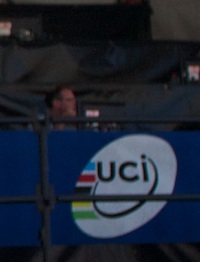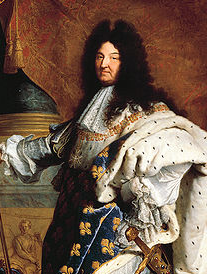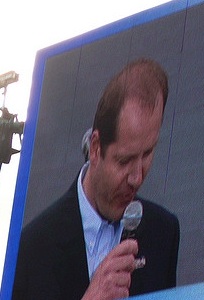Sympathy for the Devil
 I’m not an especially big fan of the UCI, but don’t let the apparel fool you—they’re far from useless. In the past two decades, the governing body has actually made some pretty solid steps for the sport.
I’m not an especially big fan of the UCI, but don’t let the apparel fool you—they’re far from useless. In the past two decades, the governing body has actually made some pretty solid steps for the sport.
When I began following cycling about a decade ago, most sponsors were essentially unknown to me—small French and Italian firms like Bonjour and Pata-Chips. But a concerted effort from the UCI to entice bigger, more secure, more international backers has lead to a host of brands I’d heard of before—Columbia, HTC, Discovery Channel, T-Mobile, Skype, RadioShack, Garmin, Transitions, Chipotle, to name a few—at least dabbling in the sport since then.
The UCI’s efforts in this area have also all but eliminated the mid-season meltdowns that struck with regularity—Mercury and Coast most prominent among them. It’s not that the UCI has made things perfect (there was Astana’s brief refusal to pay, and who could forget the phony bank guarantee), but on the whole, the efforts have had a positive impact. At the ’06 Tour, Paul Kimmage—a former domestique—was struck by how much the improved funding has made things better for replaceable, also-ran riders.
The UCI has also done well to balance this sponsor attraction with improved anti-doping efforts—no, seriously. Since McQuaid’s tenure began, and efforts got underway to move toward a ProTour-like structure, we’ve seen three (counting Contador) Yellow Jerseys removed from the backs of dopers. We’ve seen guys like Rebellin, DiLuca, Ricco, Valverde, Kohl—the best of the best—busted, tried, and removed from the sport. It may seem easy to simply improve the testing and enforce the rules, but doing this while simultaneously attracting bigger money to the sport is a mighty fine tightrope to walk.
Sure, you could point to guys like Thomas Frei who (despite getting caught) say that it’s easy to beat the tests, but even with all the drama and exclusions surrounding the Festina Affair, riders looking to dope before 2005 simply didn’t face the same challenges, frequency of testing, or stringency of punishment that they do today. Raimondas Rumsas was a fish in a barrel compared to the meticulous, consistant work done to bring down Franco Pellizotti. As I’ve said before, the tests don’t have to be perfect—just good enough to make cheating not worth the risk.
Ultima Ratio Regum
 The problem with all this positive change, however, is that much of it comes at the expense of people and business that have supported and promoted cycling for years—in some cases, for over a century. There’s nothing wrong with this per se (the doping, wage exploitation and other problems arose on their watch, after all), but they’re understandably upset to have control over a good source of income suddenly in the hands of a very isolated, very opaque group in a mountain stronghold, a thousand kilometers away.
The problem with all this positive change, however, is that much of it comes at the expense of people and business that have supported and promoted cycling for years—in some cases, for over a century. There’s nothing wrong with this per se (the doping, wage exploitation and other problems arose on their watch, after all), but they’re understandably upset to have control over a good source of income suddenly in the hands of a very isolated, very opaque group in a mountain stronghold, a thousand kilometers away.
And herein lies the root problem: the UCI’s regulatory authority stems solely from its affiliation with the International Olympic Committee. The IOC (an organization hardly known for integrity itself) has literally “blessed” the UCI as the only governing body for the world’s cycling events. When a race organizer asks “why”, the respons is “because the IOC says we can”.
As a result, the UCI simply is not set up to represent the interests of all the shareholders in cycling. While many of their extensive rule sets do seem carefully thought out, it’s an internal process. People from outside the UCI are indeed consulted—just not the ones who are likely to disagree. For example John Lelangue was a member of the radio earpiece working group in 2010, when his BMC squad’s ProTeam status just so happened to be under consideration. Should we chalk it up to coincidence that this meeting resulted in both a radio ban and guaranteed entries to all major events for Lelangue’s team?
And it’s not just radios. The UCI has seemed unable to come to terms with other groups on any number of issues. They sparred with the AFLD over dope controls at the Tour de France, and with teams on sponsor logo color choices in a sport where everything is covered in mud anyway. They’ve taken issue with seemingly meaningless equipment distinctions, and most prominently, fought with the Grand Tour organizers over control of races.
A House Divided
 The last time the UCI/Organizer Schism reared its ugly head was in 2008, ostensibly over who had the right to invite teams to events. It wasn’t a new problem—the ASO, along with Giro organizer RCS and Vuelta organizer Unipublic, previously appeared ready to break with the governing body in 2005 and 2007 over similar issues.
The last time the UCI/Organizer Schism reared its ugly head was in 2008, ostensibly over who had the right to invite teams to events. It wasn’t a new problem—the ASO, along with Giro organizer RCS and Vuelta organizer Unipublic, previously appeared ready to break with the governing body in 2005 and 2007 over similar issues.
But while it may look like the same old discussion, this time around the situation is different. For starters, the radio issue has pushed the teams and riders away from the UCI, who they (eventually) came around to supporting in ’05-’06. The Grand Tour Cartel also has the support of some of the few notable independent race organizers, including those responsible for the Tour of California—a race which, just two years ago, seemed aimed at stripping power from the Cartel by weakening the Giro.
Despite the forces of everyone else in the sport now arrayed against them, the UCI still refuses to acknowledge that this is about more than radios. Their response, an open letter from Pat McQuaid described, in too little detail and far too late, the process through which the radio ban was born. Using the doping issue when convenient (rider protests) and ignoring it when not (German TV rights), the letter comes across as a meandering populist appeal, meant to convince the disenfranchised that a ballot filed in spirit is as good as one filled out in fact.
In the past, compelling arguments have been made against a divided league. But times have changed. In 2007, the sport was still reeling from the first disqualification of a Tour winner since 1904, and coming to grips with the notion that (after seven very profitable years) addressing the doping problem head-on was better than sweeping it under the rug.
Four years and dozens of “bad for cycling” positives later, the sport still exists. The doping issue, while not solved, is actively prosecuted. There is no other sport that takes anti-doping as seriously as cycling, and as a result, there are more pressing problems—foremost among them, the inability of those who make their living in the sport to have a say in its future. And I think a split league may be the only way to guarantee that right.
The UCI needs to realize that other than IOC approval, it has no trump cards. All of the races that made cycling what it is today are the property of organizations it routinely fails to represent. Full-on rider bans—as threatened in 2008—simply won’t happen because, for better or for worse, cycling is the Tour de France. If decisions are either/or between the Olympics and the Tour, even the shut-ins at Aigle know which way the scales will tip.
Competition Means a Competitive Sport
 In my eyes, the emerging situation—if everyone digs in their heels—is two separate, non-exclusive, season-long race circuits, one run by the UCI, and the other by a committee of those currently opposing the group—and I think that has the potential to be a very good thing for cycling.
In my eyes, the emerging situation—if everyone digs in their heels—is two separate, non-exclusive, season-long race circuits, one run by the UCI, and the other by a committee of those currently opposing the group—and I think that has the potential to be a very good thing for cycling.
The UCI will hopefully retain enough pull with emerging international races like the Tour of Poland and the Quebec one-days that most teams still fulfill the legal and ethical obligations laid down in its bylaws to retain eligibility. On the other circuit, freedom from the UCI rulebook will allow the competing races to experiment with new equipment, new race formats, and to invite teams to races based on performance during the season, instead of politics the previous fall.
The split format would also make an ostensibly-independent WADA an obvious choice to oversee and enforce doping regulations in both leagues—a huge step up from the currently inconsistent patchwork of national federations.
Hopefully, the direct comparison will allow everyone involved with or following the sport to see what rules matter, and what rules probably don’t, as well as provide an open and democratic testing ground on issues from equipment to contract negotiations. Additionally, competition between the two circuits would accelerate the adoption of positive changes, and as well hastening the demise of outdated rules. One only has to look at the runaway commercial success of American Football to see that a string of competing leagues have been very good for business.
This could be construed as a fairly rosy prediction, and one that seems downright ingenuous given the past history of The Grand Tour Cartel. But as I noted earlier, the major change this time around is that riders and teams are now the driver, with the entrenched European media oligarchs simply along for the ride.
I can’t imagine a savvy dealmaker like Jon Vaughters would blithely trade one set of dictators for another—but it wouldn’t be the first time in history that a revolution has been duped.
Interesting post which covers a huge amount of ground . This past month has been absorbing with UCI in the form of Mc Queasy “guessing” what “the hog” was alluding to in his “tweets” and those of Vaughters ! Telepathy is not an asset that the Irish are well known to possess .
Given a certain number of racers were banned from the Olympics for appearing in Sth Africa years ago , threatening to stop Racers going to next years Olympic events will have little effect on the current Peloton .
Teams are certainly better equipped these days and most of the racers generally are better paid than in the past but TOO MANY people think that they are more important than the racer and thus feel that they are background noise .
WRONG ! The racer may be replaceable BUT we do not need to see people like Plaza crawl back onto the road before doing something about racer safety !
No doubt i will have more to add as more info comes to light because there is more coming !
Cosmo, I’m glad you posted on this issue – I’ve been waiting for your observations and I like your arguments (and “meandering populist appeal” is a very apt description). Much of the tension with the UCI seems to stem from its twin roles of administering and promoting the sport. The former is all well and good – (mostly) consistent rules for everyone – but the latter has meant that the UCI often looks like it’s putting together its own big money cycling league at the expense of the traditional races. Perhaps this is an old hangover of the original Olympic set up, amateur sports, now dealing with professionalism.
Anyway, the UCI’s ‘historic’ calendar is almost a de facto separate league, and one can understand the interest of these players in giving themselves more control and more ability to attract sponsors and to regulate their races. Vaughters has been very good at bringing in new sponsors for his team (New Balance and Tata Consultancy Services recently) and has vented his frustration over the exclusiveness of the pro tour set up. His supposed presence in all this gives me some confidence that a separate league could be an improvement – particularly if it’s prepared to make a fresh start in tackling doping and to give WADA a more prominent role, as you suggest.
Disingenuous, rather than ingenuous?
(Just making sure I understand what you mean.)
No, ingenuous, as in earnest, innocent, and inexperienced to the ways of the world. My intent in using it was to deflect the notion that my two-league scenario was foolishly hopeful.
I would have used “disingenuous” if I were more concerned about being cast as an anti-UCI activist, attempting to sway people to my side of the argument with a scenario I knew to be false.
Are you sure about the sponsor? You said that bigger sponsor name vs small unknown 10 years ago. I think the money is coming from different part of the world, US vs Europe and we don’t know much the European brand. And skype was a minor sponsor for last year and they did not continue. Most of this bigger funds mentioned came and left after a few years. They are not even closed to the Rabobank commitment.
The jerseys looks quite black and white or only bike compagny can buy title sponsorship. What is Leopard, high-road, bmc, cervelo, tmc? Quickstep manager sold his team because he can’t find a sponsor last year and still complain about the lack of budget. It can be justify for the bike manufacturer but they are really profitable at that point. Astana and Euskatel are partially financed by governement money. Most of these teams have a sponsorship model in which a rich guy gives them the money, NO SPONSOR.
There was a sponsoring/promotional organization before the UCI, there will be one after.
Most I know think that the UCI has become irrelevent, and counter productive.
They have had very limited success in enforcement, regulation, and promotion.
What do you think?
“Follow the Money”?
Regarding UCI’s refusal, as you mention in your post, “to acknowledge that this is about more than radios”, McQuaid’s letter seems to indicate an awareness of the building storm clouds. In it he writes, “…UCI fully believes that this is not a fight about radios but rather a fight for power and control. UCI is aware of steps being taken to set up a private league, World Cycling Tour, outside UCI, by certain team managers.”
McQuaid concludes his letter with a persuasive argument in favor of UCI control, “…would you really expect your International Federation to be run based on the outcomes of popularity contests or individual interests within **one single stakeholder** [emphasis is mine] of cycling? Is that truly a desirable quality to be found in a governing body, or do you not find it more fitting and reassuring that it be guided by the general interest, sportsmanship values and long-term sustainability?” Would that it were true!
As the final arbiter, his letter was obviously written to explain to the lowly Pro that the radio ban was demanded by the most important single stakeholder of cycling, France Television. And there you have it. Vive le Tour, no?
Wishful thinking that it will be any different with the likes of AEG running the show. I agree with the engine’s comment.
Fact Check:
The UCI hasn’t removed three yellow jerseys.
Obviously, Landis was stripped.
ASO no longer recognizes Riis as the winner, but the UCI still does.
Contador is still recognized as the current champion.
Sorry, ASO still recognizes Riis as the winner as well.
https://www.letour.fr/2011/TDF/HISTO/us/palmares.html
@Brad, Rasmussen was pulled while in yellow.
The UCI didn’t do that either.
Added a couple of posts to my blog but the source of one was :
https://forum.cyclingnews.com/showthread.php?p=471169&posted=1#post471169
This thread makes Mike Moore of TV Nation’s findings look like a saint when compared to the UCIless shenanigans !
Time someone with a big stick sorted out the UCIless management as there are a lot of Athletes being let down if there is truth in the conspiracies portrayed . ABC of Oz would have done some research before presenting some of this story , wouldn’t they ?
LEVI has quit the final day of the tour !
All he had to do was ride today to be the eventual winner !
Smells fishy to me !
I’m with Trounder….do you REALLY believe an F1 or NBA style pro cycling organization would be an improvement? How ’bout the NFL? Their model is not so healthy at present either. I could see Boss Hogg and Co. running the show and telling WADA not to bother with them, they’ll police themselves since they’re not interested in the Olympic Games. Perhaps they’d go back to 10-minute time penalties for failing the dope test, like in the old days?
The pro riders need to separate themselves from team management when it comes to a say in the sport – they’re currently just pawns in the power struggle between team managers/sponsors and the UCI. Taking the power away from UCI and handing it over to managers/sponsors will just let them be slaves to a different master. Will they figure this out in time to avoid it? I wonder.
The haters hate becuase the dopers are such damn liers.
catering podlesna forum , https://cateringwroclaw.net/dobre-jadlo-szybko-i-sprawnie.html , pizzerie piotrkow , krakow jedzenie , https://cateringwroclaw.net/na-slasku-dobra-obsluga.html , catering katowice , warszawa jedzenie na wynos , https://cateringwroclaw.net/na-slasku-zjemy-dobrze-i-smacznie.html , jedzenie fordon
The UCI will hopefully retain enough pull with emerging international races like the Tour of Poland and the Quebec one-days that most teams still fulfill the legal and ethical obligations laid down in its bylaws to retain eligibility.
a certain number of racers were banned from the Olympics for appearing in Sth Africa years ago